Discover how biomedical scientist turned teacher Sharon ensures each learner has a personalised learning experience
-
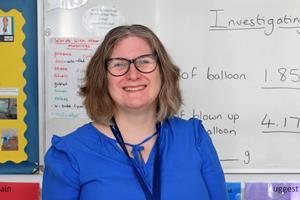
Previously a biomedical scientist, Sharon Smith has been teaching for 24 years. She is head of science and an assistant headteacher at The Pilgrim School, a hospital school for learners who are too unwell to attend mainstream school. Based in rural Lincolnshire, the school has three sites and a number of at-home learners. Sharon is responsible for managing one of the school bases and the home education service.
Image source: © Jaimee Leigh Burn
Previously a biomedical scientist, Sharon Smith has been teaching for 24 years. She is head of science and an assistant headteacher at The Pilgrim School, a hospital school for learners who are too unwell to attend mainstream school. Based in rural Lincolnshire, the school has three sites and a number of at-home learners. Alongside leading the science department, Sharon is responsible for managing one of the school bases and the home education service.
Are you involved in any extracurricular activities at school?
I am a keen baker, so make lots of cakes for school charity days. I also take part in our annual school Christmas talent show, usually with some kind of dance – a loose term.

What’s on your bookshelf?
I am not a fan of fiction and prefer to read nonfiction, so it really takes a good story to grab my interest. However, a colleague gifted me Lessons in chemistry by Bonnie Garmus, which I thoroughly recommend.
Imagine you can only share one piece of advice with your fellow teachers, what would you say?
Enjoy being in the classroom teaching a subject you love. You are having an effect even if you don’t think you are – you may never know about the impact you’re making until years later.
Describe an embarrassing moment you’d rather not relive in your classroom or teaching life …
I have had quite a few over the years and most have involved fire. Once while teaching in a mainstream school, a student’s Bunsen burner got a bit too near the window blind which went up in flames. I grabbed the sand bucket and threw the contents at the window. It put the fire out, but my technician was not happy with me as we were finding sand everywhere for weeks.
How do you relax?
I love travelling and last year fulfilled a lifetime wish to visit Niagara Falls and Toronto. I love going to concerts, and I also have a six year-old granddaughter who keeps me very busy with baking and all things crafting.
What’s your favourite teaching hack?
Lots of our students don’t like to speak aloud in class and many of them will be working on different topics and subtopics within one lesson, so I like objectives and a plenary which enable discussion with the student in their books. This also helps me plan for their next lessons. As we are a small school, I like to mark my books after most lessons. I know mainstream teachers will laugh at this.
Get involved
Want to suggest a question? Want to be the next teacher, technician or trainer in this series? Email education@rsc.org today.
One of my favourite plenaries is asking students reflective questions. I will write some on the board and ask them to answer a couple at the end of the lesson. For example, what will you tell someone this evening about what you learned today? What challenged you? What would you still like to know? The last one is great for the next lesson’s starter.
What do you wear to school? Do you have a favourite outfit for teaching?
At our school we like to wear less formal attire to help students feel at ease. I like to be comfortable, especially with my shoes, and wear something with large pockets. I don’t like wearing my lanyard when teaching as it really gets in the way, so it’s usually it my pocket with my whiteboard pen and walkie talkie.
Do you have a teaching resource you keep coming back to?
Many of our students have missed significant chunks of time in school due to their illnesses. Our school created our own schemas, which are roadmaps of knowledge that the students need to know to move through topics. For example, we use a schema about atomic structure to guide learners through this fundamental chemistry. If a student has joined us with no foundation knowledge, this tool helps us identify and address any gaps and catch them up quickly before moving on to bonding. Similarly, we can accelerate students where needed as well.
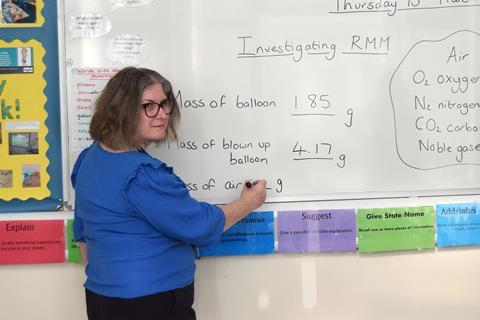
Unfortunately we don’t have a lab, so we adapt our practical work as much as we can. Where we are unable to do a practical, I find the RSC videos really helpful. I like the way they give a reason why the experiment is useful, who might use it and the steps to set it up. We find the text boxes that appear in the videos accessible for our learners.
Unfortunately we don’t have a lab, so we adapt our practical work as much as we can. Where we are unable to do a practical, I find the RSC videos really helpful (rsc.li/4iaQQM9). I like the way they give a reason why the experiment is useful, who might use it and the steps to set it up. We find the text boxes that appear in the videos accessible for our learners.
Who’s your hero?
I think this would have to be my primary school teachers: Mr Basin who showed a very simple experiment using a jam jar and a jade green mitten upside down in a bowl of water (I was amazed at how the mitten didn’t get wet), Mrs Smith who brought in a pig’s heart and lungs and Mrs Steel who did electric circuits with us. Looking back, these were the moments where my interest in science really clicked: it goes to show the importance of science education at a young age and that it doesn’t have to be anything fancy to spark an interest. This was way before the national curriculum and I think all three were very forward-thinking teachers.
Teachers ask teachers
In the last Meet the … article, we asked Jess Melville-Richards to suggest a question for the next interviewee. She asked:
What item(s) can always be found on your desk and why?
Since we don’t have a dedicated science lab, I don’t have a front bench or desk. However, I have easy access to all our practical equipment stored in two well-stocked cupboards. This is ideal for quickly adapting to situations and seizing opportunities with our students.
We asked Sharon for a question for the next interviewee and she suggested:
With advancements in AI, what do you predict science teaching and hands-on practical work will look like in 20 years’ time?
Share your responses in the comments.
Emily Kelly
Teachers ask teachers
In the May issue’s Meet the … article, we asked Jess Melville-Richards to suggest a question for the next interviewee. She asked:
What item(s) can always be found on your desk and why?
Since we don’t have a dedicated science lab, I don’t have a front bench or desk. However, I have easy access to all our practical equipment stored in two well-stocked cupboards. This is ideal for quickly adapting to situations and seizing opportunities with our students.
We asked Sharon for a question for the next interviewee and she suggested:
With advancements in AI, what do you predict science teaching and hands-on practical work will look like in 20 years’ time?





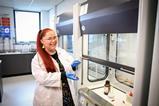
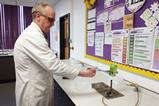
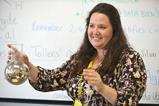



No comments yet